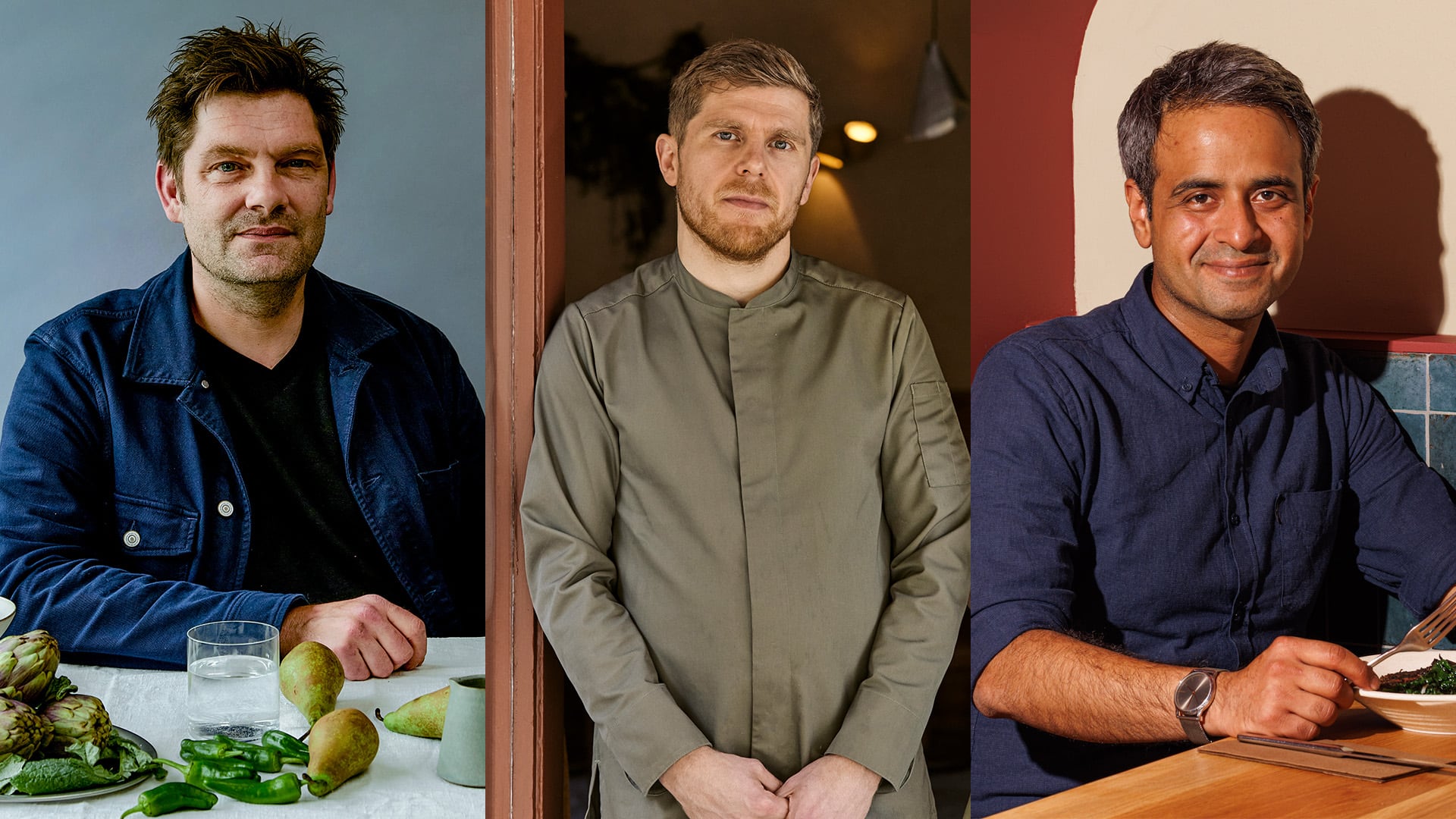Vegan chef Alexis Gauthier has recently taken to calling out people on Instagram for eating fish and meat.
It goes without saying that the Frenchman objects to animals being killed for food, but what really gets Gauthier’s goat is people with a platform who glorify their consumption. Those who have found themselves in his crosshairs include Tod Inskip (of Eating with Tod fame), Stanley Tucci and even Prince William.
This militant approach – based on his recent output, it wouldn’t be surprising if the chef comes out in combat fatigues for his next ‘tempeh tantrum’ – is completely valid and aligns perfectly with the mission of his two London restaurants: to provide the dining public with alternatives to meat and fish. To this end, he has embraced what can broadly be described as fake meat products such as 3D-printed steak and pea protein-based ‘chicken’.
His flagship Gauthier Soho reimagines French gastronomy sans animal products — it offers a vegan version of pâté de foie gras, ingeniously called faux gras — while the more casual Studio Gauthier specialises in sushi made with vegan alternatives to tuna, salmon and caviar.
While there’s no doubt Gauthier believes every word he says, the videos also serve as a savvy marketing strategy for his restaurant group. They’ve proven to be social media dynamite: his top post on TikTok – a takedown of caviar production – has been viewed 8.3 million times, and the chef is closing in on 250,000 Instagram followers.
Moving beyond imitation
Gauthier is a talented cook – he attracted a Michelin star while at Pimlico’s Roussillon in 2000, albeit cooking meat – who has done an excellent job of carving out a niche in an increasingly tough space. But as a small group of plant-based chefs are proving, there is another, quieter way.
The past few years has seen the launch of a handful of equally innovative plant-based restaurants that aren’t serving their dishes with a side order of self-righteousness. These include Michelin-starred Plates, Holy Carrot and Tendril in London, and Birmingham restaurant Land.
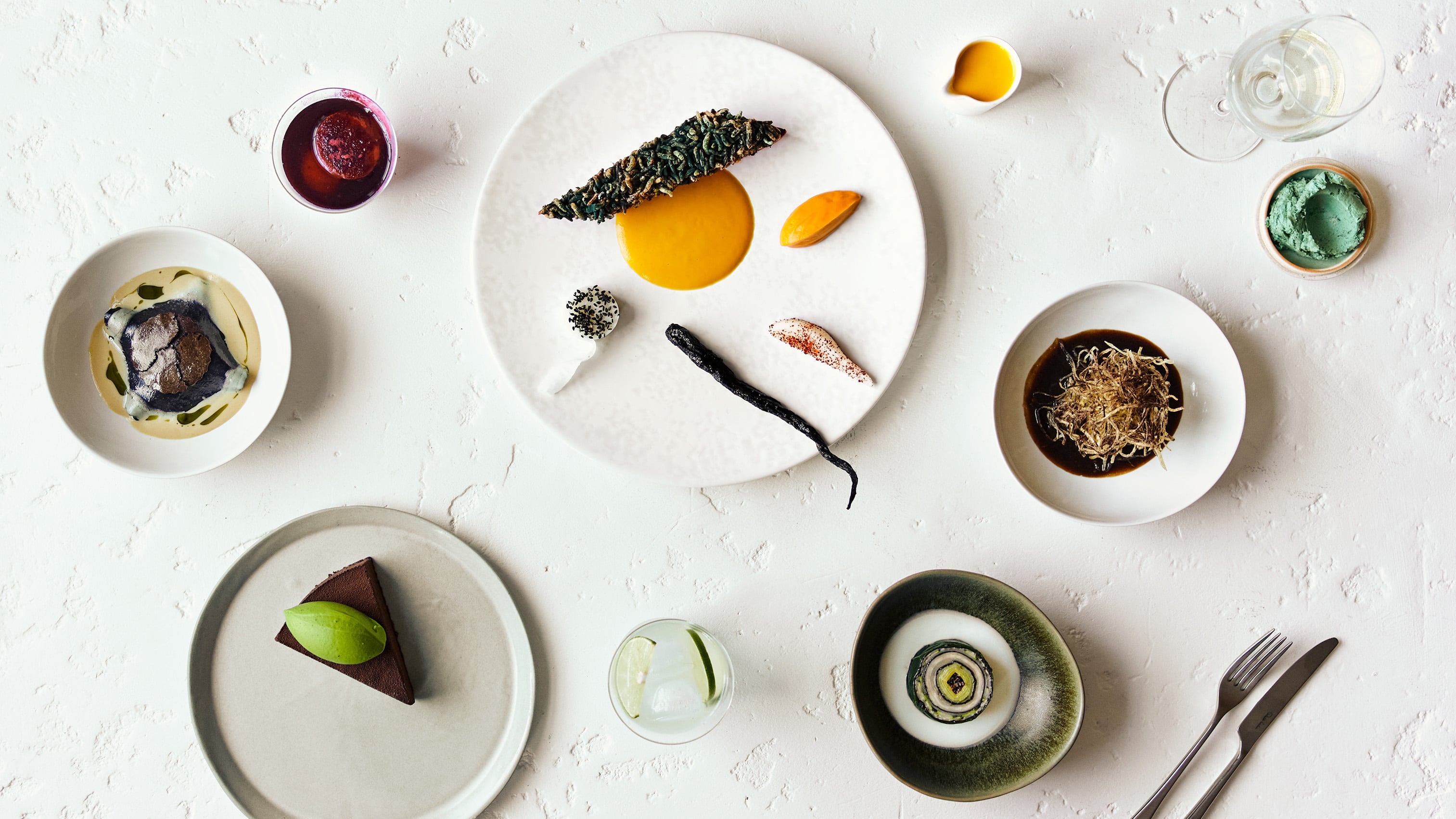
Not being out to change people’s habits means that these restaurants are not – in general – looking to provide alternatives to animal products by creating or buying in ingredients that ape the taste and texture of things like meat, fish and dairy products as Gauthier and most other contemporary vegan restaurants do.
“The difference between what we do, and a lot of other plant-based restaurants is that we’re not trying to manipulate the food too much,” says Holy Carrot executive chef Daniel Watkins. “There’s technique and skill in what we are doing but I try and keep things as simple as I can.”
Fire and ferment driven plant-based cooking
Launched by entrepreneur Irina Linovich in Knightsbridge in 2021, Holy Carrot took on a permanent site in Notting Hill last year as Watkins came on board. His distinctive ‘fire and ferment driven’ cooking is an evolution of what he was doing at Dalston’s Acme Fire Cult (the brewery-based restaurant continues to trade but is now operated solely by his former business partner chef Andrew Clarke).
Dishes include a generous skewer of trombetta courgettes glazed with fenugreek oil served on a bed of Coco de Paimpol beans dressed with olive oil and miso; crispy artichokes with a tempeh tomato sambal; and the Mexico-inspired oyster mushroom with roasted koji mole and almond tostada.
“There are only a handful of places where chefs are taking vegetable cooking really seriously. I don’t find that isolating, I find that exciting”
Holy Carrot executive chef Daniel Watkins
“I would describe what I do as vegetable cooking,” Watkins continues. “With a few exceptions we don’t buy things in and we’re not looking to recreate the experience of eating meat and fish. I find it odd that you can buy vegan short rib that has gristle running through it. I don’t understand why anyone would want that.”
Pretty much the only thing on his menu that looks to mimic an animal product-containing ingredient is a surprisingly convincing plant-based stracciatella made with fermented soybeans (this is currently bought in, but Watkins is working on a house-made version).
“It’s necessary to give people a shorthand on menus. We could describe it as fermented cream made with soybeans, but it’s quite wordy and doesn’t really get across what it is like,” Watkins continues, adding that he sometimes takes inspiration from dishes that would normally contain meat. For example, there’s a brioche bun on the lunch menu filled with a breaded and deep-fried slice of celeriac that is described as a schnitzel. “It’s difficult to write a plant-based menu without doing that occasionally, but we try and limit it.”

Boldly going where no chef has gone before
The plant-based cooking at Plates is more technical. Launched as a pop-up in 2017 by Kirk Haworth (the son of former Northcote chef Nigel Haworth), Plates opened a permanent site in Shoreditch last summer. Ahead of the launch, Haworth told Restaurant that he wanted to “change perceptions of how fruits, vegetables and plants can be transformed”.
For Haworth – who has an impressive top-end CV that includes time with Sat Bains and Phil Howard in the UK and with Mark Best and Peter Gilmore in Australia – this means a hyper creative approach and a steadfast avoidance of the clichés of plant-based cuisine.
“We want to do things nobody has done before,” he explains. “That means new techniques and new ingredients. The food must always be delicious and comforting but we also want to push the boundaries and challenge people.”
Key to Haworth’s approach is an unwillingness to imitate meat and fish (like Watkins, he does have a handful of things on his menus that reference dairy products, including butters and ‘ricotta’). “We don’t really do imitation here. We have a lion’s mane mushroom on the menu at the moment and people might occasionally say ‘oh, this is a bit like eating meat’ but that wasn’t the idea behind the dish.”
Much like Holy Carrot, the cooking at Plates is striking in its originality. Haworth – who is only 34 – combines seemingly incongruous ingredients to great effect. His £108 nine-course tasting menu sees the previously mentioned lion’s mane mushroom paired with asparagus, burnt aubergine, olive and pickled cucumber. Other dishes include a white soy custard topped with strawberry, celtuce and hibiscus granita; and Jersey Royal potatoes dressed with watercress, pickled onions, loquats, miso, yeast sauce and seaweed.
Earlier this year, Haworth became the first UK chef ever to win a Michelin star without cooking meat and fish. And he’s not stopping there. “To get a Michelin star seven months after opening was amazing. I wouldn’t say I was expecting it, but it was the goal, and I felt we were cooking at that sort of level. But we’re going to keep pushing and try and get a second one. We want Plates to keep evolving, we don’t want to be the same in a year’s time.”
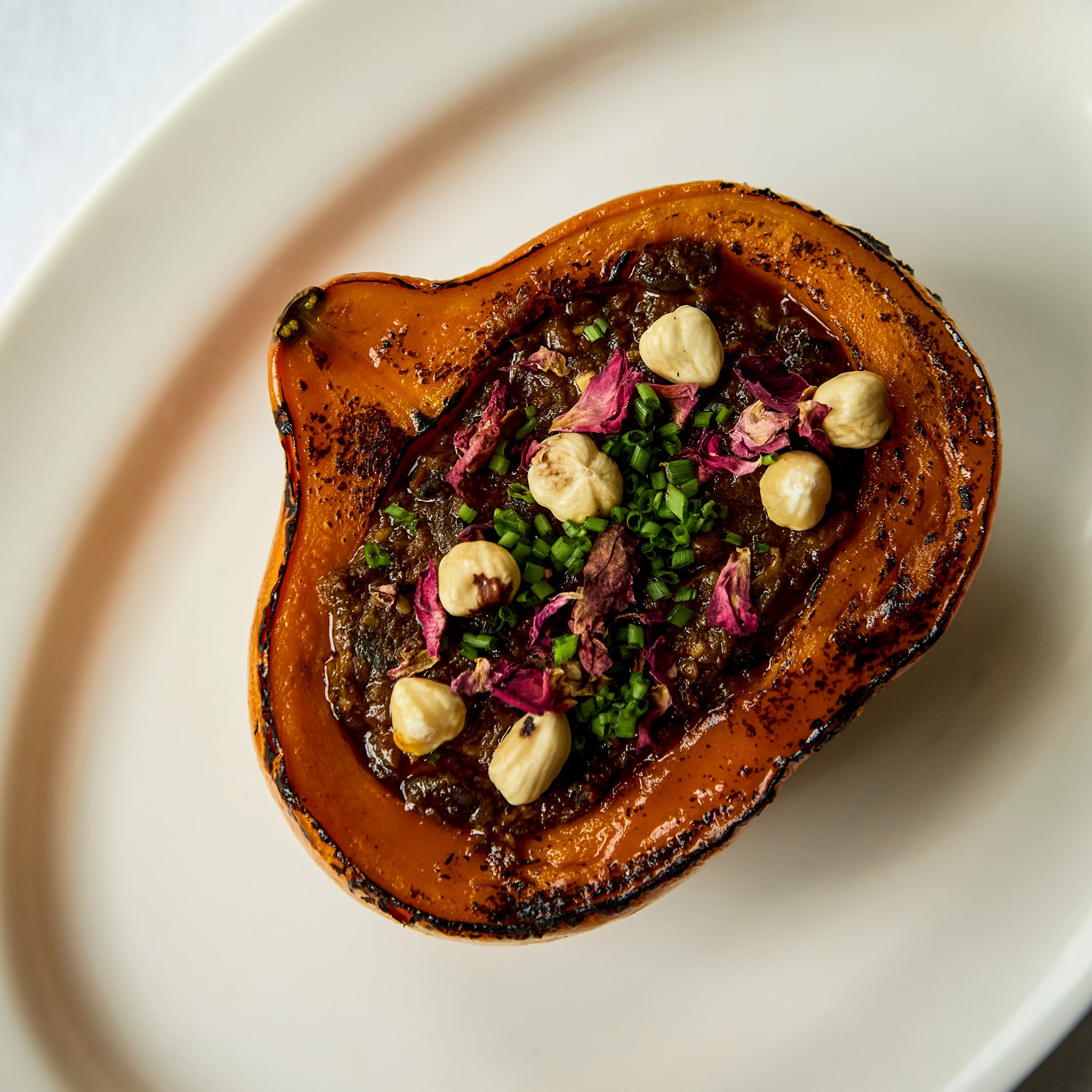
Avoiding the V word
Another common thread of this new breed of chef-led plant-based restaurant is that they seek to distance themselves from the vegan movement. Holy Carrot, Plates and Land are suitable for vegans in that the the food is free from animal products but don’t use the term on their websites or in their comms (although the latter does have a quote on its website from food critic Jay Rayner that reads “vegan cooking to file under thrilling”).
The term plant-based is often not front and centre either. On the Plates website the cooking is initially, and somewhat nebulously, described as ‘nature-inspired creativity’ (the comms surrounding the launch also avoided the term plant-based). Scroll down a little and the term plant-based is there and, in the about section, the restaurant’s chef-patron is – accurately – described as someone that is ‘becoming a leading figure in British plant-based cookery’.
“The food must always be delicious and comforting but we also want to push the boundaries and challenge people”
Plates chef patron Kirk Haworth
This policy makes sense. Veganism is an ethical stance that theoretically excludes all animal products from a person’s diet and lifestyle including things like clothing and cosmetics. Plant-based, however, is harder to pin down. For some people, a plant-based diet can include some animal products while for others it means avoiding them entirely.
Holy Carrot, meanwhile, bills itself as a vegetable-forward establishment. “When we created this restaurant, we wanted to appeal to everyone. Unfortunately, there is a stigma attached to the word vegan and even plant based. But others will use those terms to describe us, and that’s fine,” says Watkins, who estimates that around 60% of his customers follow either a plant-based or vegan diet.
Over at Plates, it’s a very different story: Haworth believes that only a tiny proportion of his customers follow a strict animal-free diet.
“I speak to every table that comes in and I reckon it’s about 3%,” he says. “That was always the plan. This food is for everyone, not just people that eat a certain way. We’ve done a lot of work on the brand and the restaurant to ensure people are intrigued and want to eat here.”
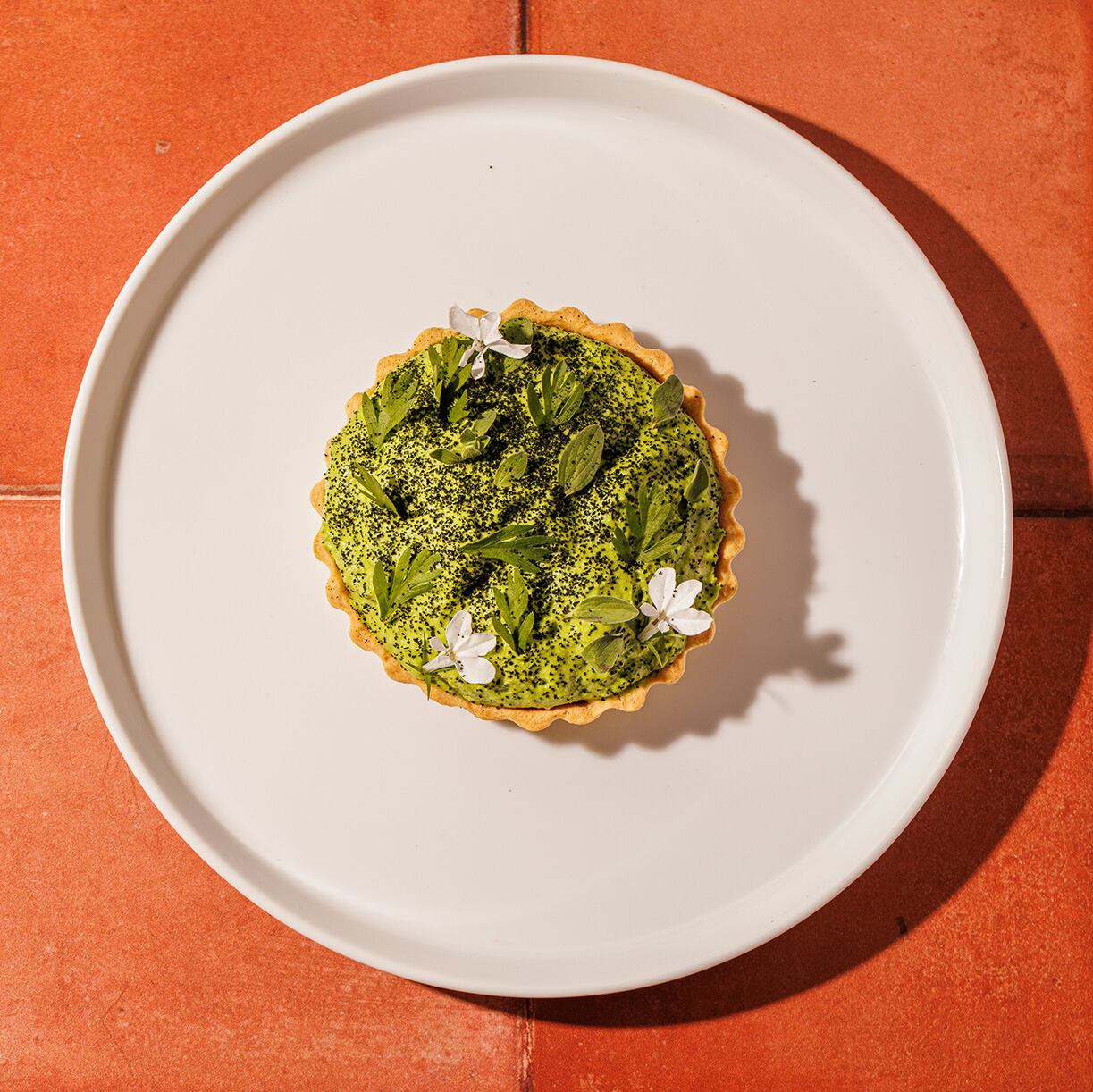
A mostly vegan stance
Tendril, which bills itself as a ‘mostly vegan kitchen and bar’, sits apart from Holy Carrot, Plates and Land because it incorporates some dairy products into its menu.
Opened by former The Fat Duck and Chiltern Firehouse chef Rishim Sachdeva in 2023, the Mayfair restaurant has been ‘conceived to help London eat less meat’. The casually upscale positioning is comparable to Holy Carrot, with smaller dishes hovering around the £10 mark and mains priced at a little under £20.
“Vegetables are not nearly as cheap as they once were, and labour costs are higher. It takes a lot of time to process vegetables when you’re working at this sort of level”
Tendril chef patron Rishim Sachdeva
Sachdeva – who includes cheese on his menu simply because he is unable to give it up himself – creates punchy and colourful dishes including oyster mushroom prepared like satay with pumpkin seeds and coriander; grilled mastelo (a cow’s milk cheese from Greece) with togarashi and smoked honey; and Chinatown-inspired purple potatoes with sticky soy and sesame.
Sachdeva says that margin can be a challenge because there is a perception that plant-based restaurants should be less expensive than those that serve meat and fish. “Vegetables, especially good vegetables, are not nearly as cheap as they once were, and labour costs are higher. It takes a lot of time to process vegetables when you’re working at this sort of level.”
One tactic used at Tendril to reinforce a sense of value is to give guests ‘free’ snacks made with the trimmings of some of the produce.
But despite these challenges, plant-based restaurants working at a high level are in general able to undercut restaurants that serve meat. This, perhaps, makes it easier for destination restaurants like Plates to get people to give them a go.
Rising to the challenge
If chefs like Watkins and Haworth aren’t out to prove an ethical point, then why are they doing it? Creating dishes in which vegetables are the star of the show is hard and - on top of that - plant-based chefs are also cut off from a lot of things that traditionally run kitchens rely upon to amplify flavour, not least butter, cream, and meat stock. For both of them, it’s about the challenge and the lack of rules. As Haworth memorably told Restaurant last year, there’s no manual for plant-based cuisine.
“I’m a classically trained chef that has spent the past 15 years of my life cooking meat and fish. What I do now takes much more brainwork. If you get a beautiful scallop straight out of the sea you don’t need to do much to make it absolutely delicious. But you can’t just pull a carrot out of the ground and serve it with some olive oil. This is a very different game.”
“There are only a handful of places where chefs are taking vegetable cooking really seriously,” adds Watkins. “I don’t find that isolating, I find that exciting.”
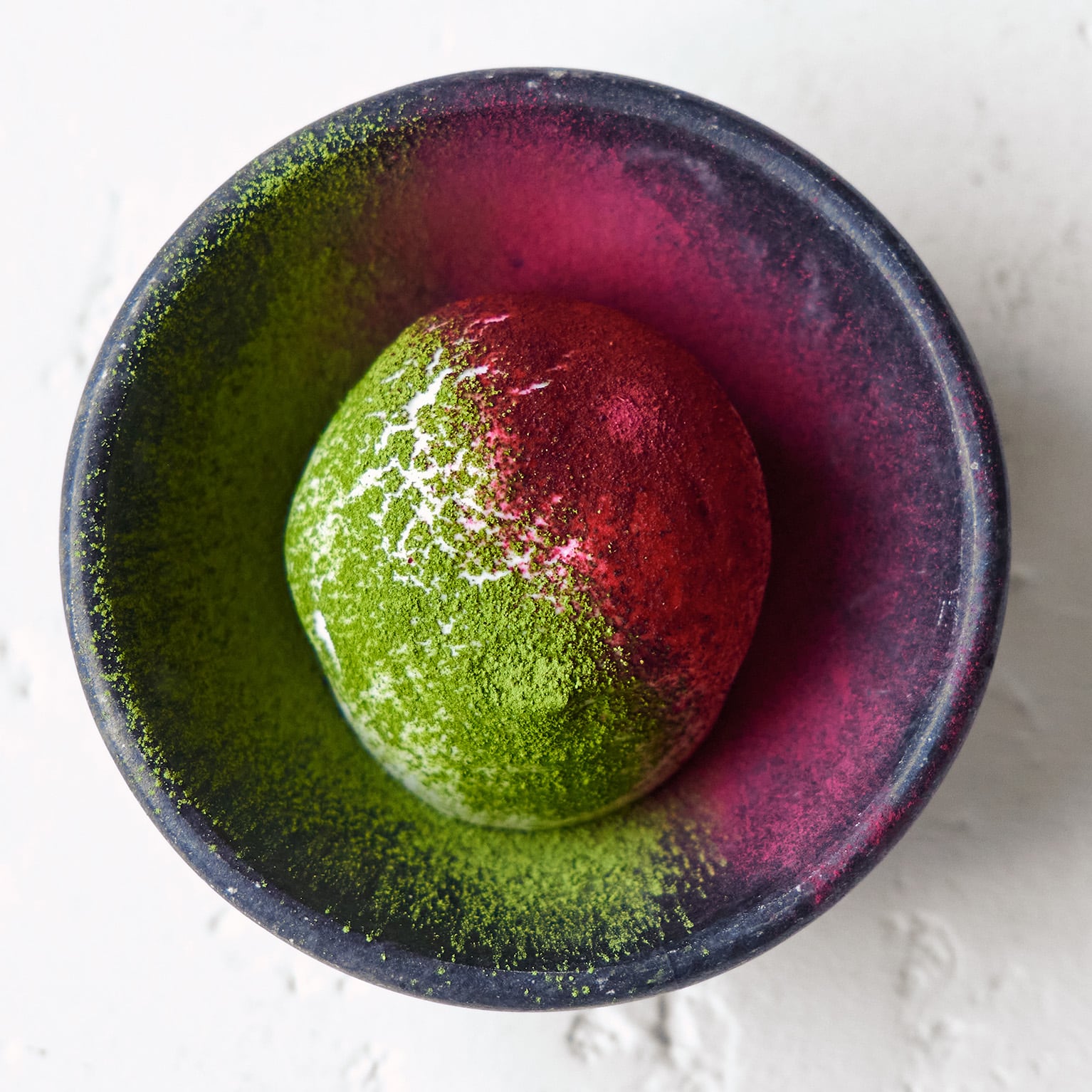
A growing niche in the plant-based space
This combination of innovative, exciting and accessible cooking has seen this new wave of plant-based restaurants succeed where many others have failed. Investment poured into the wider space at the start of the decade but the bubble burst two or so years ago with sales of specialist products in supermarkets stagnating, which caused a number of manufacturers to collapse and plant-based restaurant groups to either go backwards or disappear completely.
Last year, Sachdeva launched a more casual follow-up to Tendril within Somerset House. Named after the connecting stalk that attaches a plant stem to its leaf, Café Petiole offers food to eat in and grab and go and, like its older Mayfair sibling, does use a smattering of dairy ingredients.
Haworth (and his sister Keeley, with whom he runs the business) are also growing their business. Last month, the pair welcomed their first cohort of guests to their Plates Farm and Retreat in southwestern France. The farm and luxury escape provides grown and foraged ingredients for their London operation while also offering a place for ‘guests to escape the city and reduce pace, finding inspiration in the surrounding nature’.
“If you get a beautiful scallop straight out of the sea you don’t need to do much to make it delicious. But you can’t just pull a carrot out of the ground and serve it with some olive oil. This is a very different game”
Plates chef patron Kirk Haworth
Haworth has also doubled down at his flagship over the past few months, removing some covers to allow for more complex dishes and also installing a separate development kitchen and chef’s table.
“We are in the process of separating the creative from the production. We want to make the dining experience here more detailed,” says Haworth, who has also recently employed a development chef and a further chef to work solely on his restaurant’s fermentation programme.
Later this summer, Holy Carrot will open a much larger site in Old Spitalfields Market. The brand’s second outing will share the same DNA as its west London sibling but will be more casually positioned (the full food offering has yet to be announced, but Watkins does let slip there will be pizza). Considerably more space will also see the team place greater emphasis on their fermentation programme and the production of specialist vegan products like koji-cured tempeh.
To have a business model that is vegetable-forward is a good thing,” Watkins says. “Without getting too deep, meat and fish isn’t sustainable, and prices are going through the roof. There feels like there is longevity in this.”


